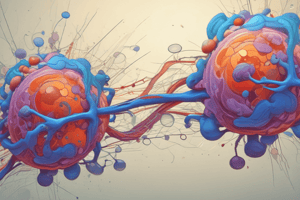Podcast
Questions and Answers
Oxidative stress is caused by an excess of antioxidants within the cell.
Oxidative stress is caused by an excess of antioxidants within the cell.
False (B)
ROS are only produced as by-products of mitochondrial respiration.
ROS are only produced as by-products of mitochondrial respiration.
False (B)
The biological system has no mechanisms to maintain the oxidative balance.
The biological system has no mechanisms to maintain the oxidative balance.
False (B)
NOX1 is not a membrane-bound enzyme complex
NOX1 is not a membrane-bound enzyme complex
CYP450 proteins are not involved in Phase I metabolism of xenobiotics
CYP450 proteins are not involved in Phase I metabolism of xenobiotics
Peroxisomes primarily play a role in carbohydrate metabolism
Peroxisomes primarily play a role in carbohydrate metabolism
NP-induced ROS cannot cause genetic damage
NP-induced ROS cannot cause genetic damage
β-carotene is a strong antioxidant.
β-carotene is a strong antioxidant.
Ascorbic acid is a lipid-soluble vitamin.
Ascorbic acid is a lipid-soluble vitamin.
The induction of oxidative stress by NPs can only lead to negative health outcomes.
The induction of oxidative stress by NPs can only lead to negative health outcomes.
Oxidative stress is not associated with aging, cancer, vascular disease, neurodegeneration, diabetes or inflammation.
Oxidative stress is not associated with aging, cancer, vascular disease, neurodegeneration, diabetes or inflammation.
P53 is a tumor suppressor that plays a role in the link between oxidative stress and aging.
P53 is a tumor suppressor that plays a role in the link between oxidative stress and aging.
During low levels of oxidative stress, p53 promotes the production of oxidants which leads to cell death.
During low levels of oxidative stress, p53 promotes the production of oxidants which leads to cell death.
SOD is an enzymatic system that converts O2− to H2O2 and has three isoforms in humans that are found in different subcellular locations.
SOD is an enzymatic system that converts O2− to H2O2 and has three isoforms in humans that are found in different subcellular locations.
Flashcards are hidden until you start studying




